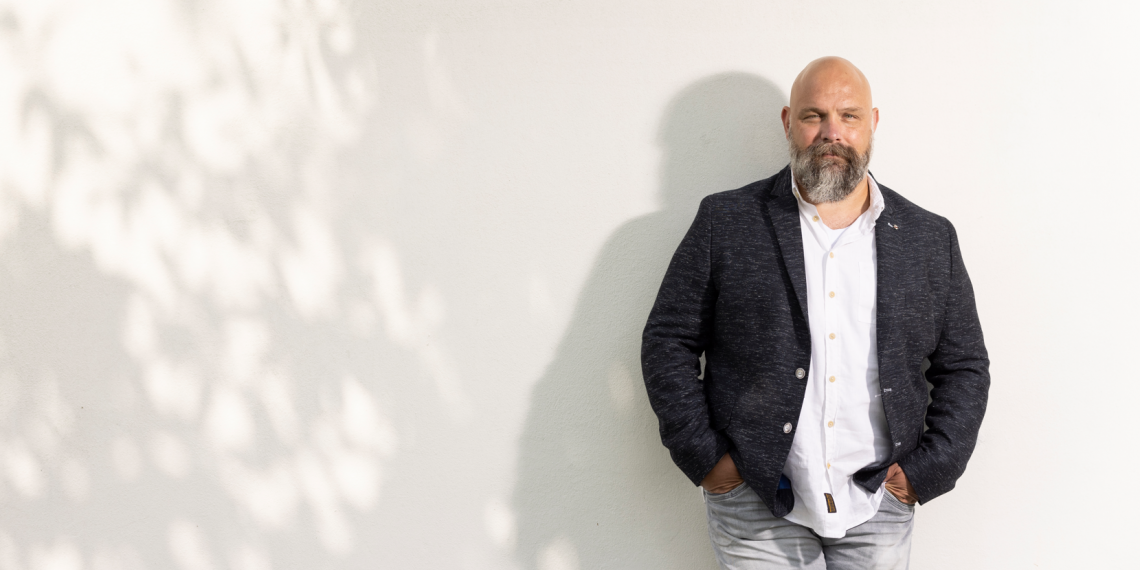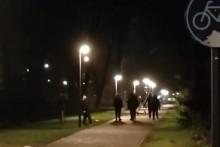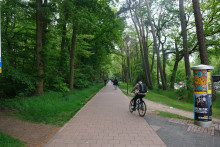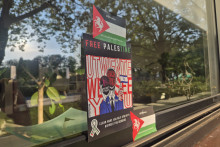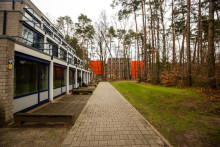Kiers is wearing sunglasses as he starts his tour of the campus. Together with his beard and a clean-shaven head, the shades complete his 'look' as Head of Security. It’s the job of him and his team to keep the university safe. His patrol begins at the main entrance, where Kiers takes a moment to pause at The Head, the newest art installation on campus. He casts a glance at this gigantic piece of copper. ‘When it was first installed, I stood in the car park for a while and couldn’t decide what I thought of it all...' Then he started looking at it from the point of view of a security guard: ‘That thing is ten metres high, so you don't want to fall off it. The first weekend alone, we had to remove two students. I thought, this is going to be quite the challenge for us at Security.’
Kiers continues his patrol onwards in the direction of the UT festival grounds. In this post-Covid era, the campus is flooded with events, as it always was, from the Batavierenrace to hardstyle parties. The Head of Security thinks ‘it’s wonderful that this is all possible again.’ ‘I'm more of a metal person myself, by the way. I’m going to a festival near my home town of Klazienaveen, in Drenthe, this weekend. Bands come to jam there from all over the world. It's great, man! My 17-year-old son happens to like the same music so he’s joining us for the first time this weekend. Music is emotion. It’s always played an important part in my life. I used to play in a metal band – I was a guitarist and singer. My favourite is Jimi Hendrix, although he had nothing to do with metal music. But when it comes to guitar, he was the absolute master. There’s a reason my son is called Jimi! And he also plays the guitar. My children are the best thing that’s happened to me. They are a little older now and I love seeing how they are developing.’
Military
As well as his son Jimi, Kiers also has a daughter called Manon. When she was born, Kiers talked things over with his wife Elles, and decided it was time to join life on civvy street. Before that, he had been a serviceman for more than eight years. ‘I was one of the last to be called up for military service. I eventually ended up working in the Air Force Surveillance Department. I really enjoyed my time there; twice I ended up going on a mission during the war in Yugoslavia. The first time was to support the F16s in Italy. We spent our time at Lake Garda in the height of summer – let’s put it this way, it could have been worse! The second time, I had to go to Albania on a helicopter mission. That was a more intense experience and I saw a lot more of the local misery. Going on a mission is a very special experience in your life. You have to look after yourself for six months. It’s also incredible to experience the camaraderie of the mission: you do everything together, from eating, sleeping and working to going out. When you hit it off with people, you end up forming a really close bond with them. I’ve never experienced anything so strong anywhere else. We still try to organise a reunion for us all on a regular basis.’
After the Air Force, Kiers went on to work as a private security guard. And he also works as an Assistant Business Unit Manager. Kiers explains that it took a while to get used to being a part of civilian life again. 'We treat each other differently in the military than we do in ordinary society. Everything is more direct in the military. Yes means yes, and no means no. I regularly get told now that I could be a little less direct. At the UT, it’s a very different culture than working in defence. Here, people will ask you why something isn’t allowed. Who decided that? Isn’t there a way round it? In fact, that reminds me of a story. A bicycle was once left on campus where it shouldn’t have been. As Head of Security, I simply cut the lock and removed it. A few days later, the student who owned the bike came into my room, carrying a law book in his hand. He had come to seek redress. To be honest, I thought it was wonderful that he did this. I refunded his lock, but I also asked him to never leave his bike in that spot again. In the end, he reluctantly agreed to this. I suppose what I’m saying is that it is sometimes good to take a critical look at things. But as an ex-military man, it is sometimes damned hard to take that into account, haha.’
Tolerance
Our route takes us in the direction of the student accommodation. It is remarkably quiet in the middle of the day. The only sound that can be heard is of a bird singing. ‘With all this lovely weather, the barbecues are sure to be lit again tonight to the sound of music playing,’ says Kiers. ‘And there's nothing wrong with that. As the Security team, we do have a lot of contact with students. Unfortunately, we often find it is our job to tell them that certain things are just not allowed. Or worse still, we have to submit a report and take further action. Sometimes, I really don’t like doing this.’ According to the Head of Security, a lot of things are possible and permitted on the campus. However, a rapid growth in student numbers over recent years has placed increased pressure on facilities. ‘We’re seeing more and more students, which is great. But as a result of that, we also have to make better arrangements. We have tolerated a lot of things on the campus for a long time. But we’re now at a point where we can’t put up with things any more, otherwise things will really start to go wrong. Think about the fact that students have open fires at the student residences. You just can't do something like that in a residential area.’
And there is also something else that worries Kiers. ‘Residential thefts from student housing are also a real problem. We have seen a record number of burglaries this year. Students don’t always lock their windows and doors and opportunities can turn people into thieves. I find this such a shame, because students have lost their expensive laptops or gaming computers in this way. Perhaps it’s to do with social control. Students used to know exactly who was living in their flats, but over recent years this seems to no longer be the case. It’s important that if students see anything suspicious, they report it immediately. We can then take action.’
Illness
So enough about student accommodation. Kiers has now turned in the direction of the UT Sports Centre. It has recently become quite an important place for him. ‘I try to exercise two or three times a week in the Sports Centre so I can build up my fitness. I have been ill for a long time because of a tumour on my adrenal gland. When I was exercising or moving around, I became more and more tired. I was out of breath going up the stairs in my house. It was mad. It seemed like I had some sort of flu, or at least that’s what the doctor said. But I ended up getting worse and worse. First, I was taken into the regional hospital and then finally, thank goodness, I was transferred to UMCG in Groningen. That’s where I had an operation. My surgeon had introduced the technology from Australia into the Netherlands. That horrible nagging feeling has disappeared now, and it’s all thanks to the operation – I’m so grateful to the medical community.’
His illness largely coincided with the Covid pandemic. ‘It was right in the middle of when we were all working from home. So it wasn’t that obvious that I was off work. A couple of my colleagues took care of some of my duties. And I’m very grateful to them for that. But you know, people at the UT look out for each other a lot. After the operation, I felt so good that I went on a 30 km bike ride and I began thinking that I could return to work. But my supervisor, an HR manager at the UT, didn’t agree with me. In hindsight, that was a good thing. I was prevented from overdoing it and it gave me the chance to recover at my own pace. Meanwhile, things are looking good, although I’m having to put in a lot of effort to get my fitness levels back. It takes time. But it's not surprising since I haven't been able to do anything for a year and a half.’
Short fuses
Although colleagues took care of his responsibilities in part when he was absent and the organisation supported him, Kiers did struggle with his own absence on campus during the pandemic. ‘It was a chaotic time. Staff and students were told to stay at home, but as the Security team, we still dealt with lots of issues. As a manager, I found it difficult to not always be there. There were lots of people from outside the campus, for example, who came to play sports and sometimes more people gathered in a group than was permitted. We had to speak to people about this, but we discovered that some people had very short fuses. One of our colleagues asked a group to keep their distance from each other. The group turned out to be a family, which of course our security guard couldn’t have immediately known. The mother adopted a particularly lofty tone of voice and said she was not prepared to talk to the security guard until she had congratulated her daughter, who was apparently celebrating her birthday. I don’t think that this is how we should treat each other. I honestly hope we don’t ever see anything like this period again.'
Meanwhile, our campus tour is almost over. Kiers walks back to the headquarters in the Spiegel, where he is due to hold two annual appraisals with his security guards. ‘I worked up a good sweat during the walk – of course, that has everything to do with my level of fitness. Oh well, during the annual appraisals at least my colleagues will know where I'm at right now,’ he laughs.


